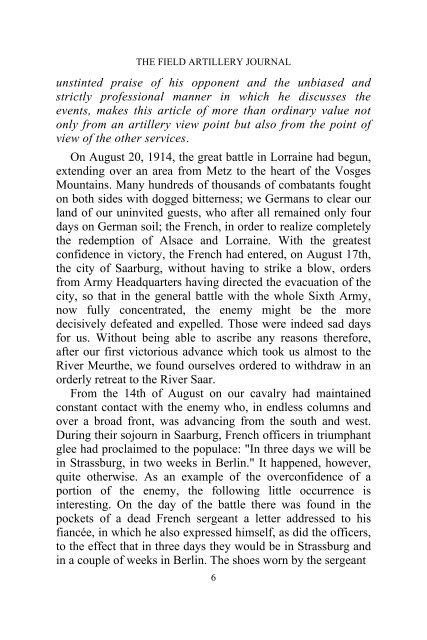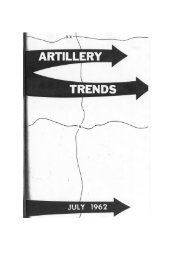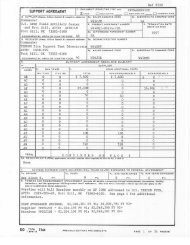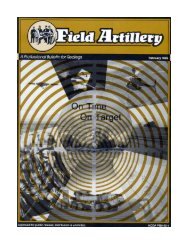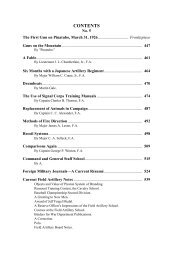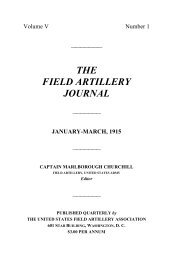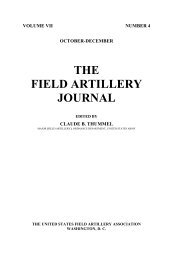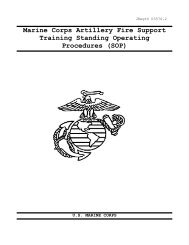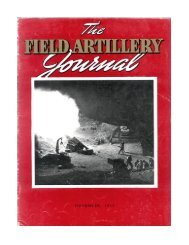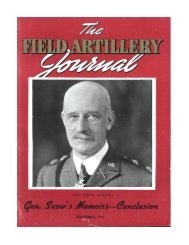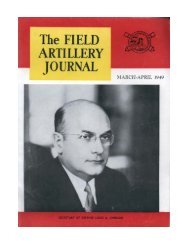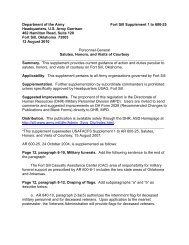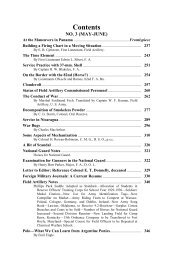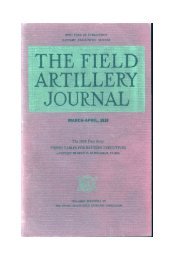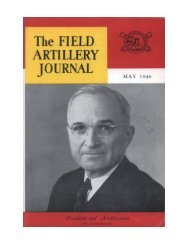the field artillery journal - Fort Sill - U.S. Army
the field artillery journal - Fort Sill - U.S. Army
the field artillery journal - Fort Sill - U.S. Army
Create successful ePaper yourself
Turn your PDF publications into a flip-book with our unique Google optimized e-Paper software.
THE FIELD ARTILLERY JOURNAL<br />
unstinted praise of his opponent and <strong>the</strong> unbiased and<br />
strictly professional manner in which he discusses <strong>the</strong><br />
events, makes this article of more than ordinary value not<br />
only from an <strong>artillery</strong> view point but also from <strong>the</strong> point of<br />
view of <strong>the</strong> o<strong>the</strong>r services.<br />
On August 20, 1914, <strong>the</strong> great battle in Lorraine had begun,<br />
extending over an area from Metz to <strong>the</strong> heart of <strong>the</strong> Vosges<br />
Mountains. Many hundreds of thousands of combatants fought<br />
on both sides with dogged bitterness; we Germans to clear our<br />
land of our uninvited guests, who after all remained only four<br />
days on German soil; <strong>the</strong> French, in order to realize completely<br />
<strong>the</strong> redemption of Alsace and Lorraine. With <strong>the</strong> greatest<br />
confidence in victory, <strong>the</strong> French had entered, on August 17th,<br />
<strong>the</strong> city of Saarburg, without having to strike a blow, orders<br />
from <strong>Army</strong> Headquarters having directed <strong>the</strong> evacuation of <strong>the</strong><br />
city, so that in <strong>the</strong> general battle with <strong>the</strong> whole Sixth <strong>Army</strong>,<br />
now fully concentrated, <strong>the</strong> enemy might be <strong>the</strong> more<br />
decisively defeated and expelled. Those were indeed sad days<br />
for us. Without being able to ascribe any reasons <strong>the</strong>refore,<br />
after our first victorious advance which took us almost to <strong>the</strong><br />
River Meur<strong>the</strong>, we found ourselves ordered to withdraw in an<br />
orderly retreat to <strong>the</strong> River Saar.<br />
From <strong>the</strong> 14th of August on our cavalry had maintained<br />
constant contact with <strong>the</strong> enemy who, in endless columns and<br />
over a broad front, was advancing from <strong>the</strong> south and west.<br />
During <strong>the</strong>ir sojourn in Saarburg, French officers in triumphant<br />
glee had proclaimed to <strong>the</strong> populace: "In three days we will be<br />
in Strassburg, in two weeks in Berlin." It happened, however,<br />
quite o<strong>the</strong>rwise. As an example of <strong>the</strong> overconfidence of a<br />
portion of <strong>the</strong> enemy, <strong>the</strong> following little occurrence is<br />
interesting. On <strong>the</strong> day of <strong>the</strong> battle <strong>the</strong>re was found in <strong>the</strong><br />
pockets of a dead French sergeant a letter addressed to his<br />
fiancée, in which he also expressed himself, as did <strong>the</strong> officers,<br />
to <strong>the</strong> effect that in three days <strong>the</strong>y would be in Strassburg and<br />
in a couple of weeks in Berlin. The shoes worn by <strong>the</strong> sergeant<br />
6


